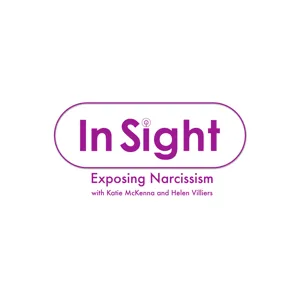Podcast Summary
Struggling with health concerns and fear of being perceived as overzealous: Recognize self-gaslighting signs and trust instincts, especially regarding health concerns. Delicious and slimming-friendly alternatives can help during stressful times.
Self-gaslighting can manifest in various ways, even in seemingly insignificant situations. Katie shared an experience where she struggled to determine if she should seek medical help for a recurring neck issue due to fear of being perceived as overzealous or smothering. This experience highlights the importance of recognizing the signs of self-gaslighting and trusting one's instincts, especially when it comes to health concerns. The new cookbook "Pinch of Nom Enjoy" by Kate and Kate Allinson, mentioned in the podcast, can provide delicious and slimming-friendly alternatives to enjoy during stressful times.
Ignoring serious health symptoms can lead to dire consequences: Don't delay seeking medical help for health concerns, even if they seem minor. Open communication with loved ones and healthcare professionals is crucial for prioritizing your health.
Underestimating one's own health concerns and delaying medical attention can have serious consequences. In the discussed situation, a woman had been experiencing intense pain in her neck and arm for an extended period. Despite her discomfort, she hesitated to call for an ambulance due to her belief that her symptoms were not severe enough. Her friend, who was also present during the incident, tried to convince her to seek medical help, but the woman continued to hesitate. Eventually, the woman's condition worsened, and she was unable to move or turn her head. She finally called for an ambulance, but due to the severity of her injury, she faced a long wait for medical assistance. The incident served as a reminder that it is essential to prioritize one's health and not delay seeking medical attention when needed. The incident also highlighted the importance of having open and honest communication with loved ones and healthcare professionals about one's health concerns.
Fear of making a fuss prevents seeking help during emergencies: Fear of causing disturbance can lead individuals to neglect their own needs, even during emergencies. Healthy relationships provide support and encouragement to seek help when necessary.
Self-gaslighting and the fear of making a fuss can prevent individuals from seeking help during emergencies, even when they are in genuine need. This was evident in the speaker's experience when she downplayed her own health crisis and prioritized her daughter's emotional well-being over her own. Her 15-year-old son, who had witnessed the situation, also showed signs of neglecting his own feelings. The speaker acknowledged that growing up in a narcissistic environment instilled a deep-rooted fear of being the center of attention and causing a disturbance. However, it is crucial to recognize that prioritizing others' needs does not diminish the importance of addressing one's own. In healthy relationships, friends and loved ones would support and encourage seeking help when necessary. The speaker's experience also highlighted the importance of addressing the fear of making a fuss in therapeutic settings, as it is a common sentiment among her client group.
The disconnect between emotional and physical pain: People may downplay their physical pain due to cognitive awareness, potentially leading to underestimation of injuries or health conditions. Prioritize health and challenge societal norms and personal biases to seek help when needed.
People often minimize their physical pain, even when it's serious, due to the belief that cognitive awareness means the pain isn't significant. This disconnection between emotional and physical pain can lead to underestimating the severity of injuries or health conditions. It's essential to recognize the validity of physical pain and trust our instincts when we suspect something is wrong. Additionally, societal norms and personal experiences can influence our perception of when to seek medical help. It's crucial to challenge these biases and prioritize our health and well-being.
Recognizing the Importance of Triage and Validating Our Own Pain: Parents should remember that medical professionals use triage systems to prioritize care, and it's important to validate our own pain and seek help when needed to make informed decisions for ourselves and our children.
As parents, we often find ourselves in situations where we have to make medical decisions for our children, despite not being trained medical professionals. This can lead to self-doubt and second-guessing ourselves, especially when our children have injuries that may not require medical attention right away. However, it's important to remember that medical professionals use triage systems to ensure that those who truly need medical attention receive it, and that unnecessary radiation or treatments are avoided. Additionally, we can easily downplay or ignore our own pain and discomfort, leading to missed diagnoses and inadequate treatment. It's crucial to prioritize our own health and well-being, even if it means seeking help and validation from medical professionals when needed. By recognizing the importance of triage and validating our own pain, we can make informed decisions for ourselves and our children.
Facing Shame and Inner Child Work: Unaddressed shame can prevent us from seeking help and lead to inner child issues, grief, and a desire for independence. When met with compassion, understanding, and empathy, shame can shift and no longer have power.
Fear of judgment and shame can prevent us from seeking help and care for ourselves, leading to inner child work and the need to address where else these feelings are present. Shame thrives in secrecy and darkness, but when met with compassion, understanding, and empathy, it can shift and no longer have power. Additionally, unaddressed shame can lead to grief over past experiences and feelings of neglect or lack of priority. The discussion also highlighted the impact of growing up in a dysfunctional family environment, where the child is parentified and not prioritized, leading to feelings of anger, sadness, and a desire for independence. It's essential to acknowledge and validate these experiences and seek help to process and heal from them.
Speaker's complicated relationship with her father: Despite a father's public image, personal hurtful actions can complicate relationships, leaving individuals feeling conflicted and unsure of how to navigate them. Seeking professional help can provide valuable insight and support.
Despite the speaker's father portraying an image of being a great dad, the speaker experienced hurtful actions growing up. The father's reactions to the speaker's attempts to seek help and his criticism of the speaker's parenting create a complicated dynamic. The speaker feels guilty for not wanting to see her father often, but also feels invalidated by his past actions and present behavior. She wonders if it's possible to have a relationship without addressing the past and if it's realistic to expect change from her father. Ultimately, the speaker is left feeling conflicted and unsure of how to navigate this complex relationship. It's important to note that everyone's experiences and relationships are unique, and seeking professional help, such as therapy, can provide valuable insight and support.
A father's emotional manipulation and deceit led to the listener's self-doubt and confusion: The listener's upbringing in a traumatic environment of emotional manipulation, guilt, and deceit perpetuated a cycle of abuse, leading to her current struggles with self-validation and healthy boundaries.
The listener's father's prioritization of himself and emotional manipulation led to the listener's self-gaslighting and internalized guilt. The father's inappropriate behavior, including discussing his suicide threats and cutting off the telephone line, created a traumatic environment. The listener's mother's absence and the father's deceitful portrayal of their relationship further compounded the issue. The father's conditioning of the listener to prioritize his needs above her own perpetuated a cycle of abuse, and the father's lies about their loving family life added to the listener's confusion. Overall, the listener's upbringing in an environment of emotional manipulation, guilt, and trauma led to her current struggles with self-validation and healthy boundaries.
Father's Deceptive Behavior Towards Grandchildren: Recognize inconsistencies between people's actions and words, particularly within family dynamics, as they can lead to damaging consequences and potential harm.
Appearances can be deceiving when it comes to assessing someone's true intentions and actions towards us, especially within family dynamics. The speaker in this discussion shares an experience of a father who presents himself as a loving and supportive grandparent but fails to live up to that image in practice. Instead, he leaves the mother to handle the practical aspects of caring for her children while he focuses on maintaining an illusion of being a wonderful parent. This behavior is damaging and can lead to confusion, self-doubt, and even potential emotional or sexual abuse. It's crucial to recognize these patterns and question the motives behind people's actions, particularly when they don't align with their words. In this case, the father's inconsistencies and lack of support create a toxic environment that can negatively impact the children and the mother's well-being.
Recognizing Covert Sexual Abuse: Covert sexual abuse can cause deep-rooted shame and confusion around sexuality, impacting a person's ability to express themselves and maintain healthy relationships. Recognize and address it to prevent long-term harm.
Covert sexual abuse, though less overt than other forms, can be just as damaging to a child's sexual development and overall relationship with sex. This type of abuse involves intruding on a child's privacy, discussing sexual topics inappropriately, and forcing awareness of adult sexuality. The result is a deep-rooted sense of shame and confusion around sexuality, making it more about shame than pleasure. This can impact a person's ability to express their sexuality, enjoy sexual encounters, and maintain healthy relationships throughout their lives. It's essential to recognize and address covert sexual abuse to prevent long-term harm. Additionally, it's crucial to acknowledge and validate the strength and resilience of those who have experienced such abuse and have taken steps to escape and heal.
Hasty decisions in relationships can be harmful and abusive: Rushing into marriage or expecting a partner to abandon their children can lead to selfish and abusive behavior, contradicting the image of a loving and caring father.
Hasty decisions in relationships, especially those involving marriage and the involvement of children, can have serious consequences and can be harmful and abusive. The discussion revolves around a man who met a woman on the internet, proposed to her on their first meeting, and then expected his partner to give up her children to join him. This behavior was not only selfish but also abusive and neglectful. The confusion arises when the man portrays himself as a great father, but his actions contradict this image. The situation may bring up memories of mail-order bride scenarios and potentially coercive transactions. Overall, it is crucial to consider the impact of our actions on ourselves and those around us, especially when it comes to matters of love and family.
Prioritizing Self Over Children and Significant Others: Centering oneself as a priority in relationships can be healthy, but becoming manipulative and avoiding accountability is not. Open communication and support are crucial for addressing challenges.
Prioritizing one's own needs and desires over the well-being of children or significant others can be a sign of impaired self-awareness and manipulative behavior. The speaker in this conversation emphasizes that her children are her top priority and that anyone who asks her to exclude them is a non-negotiable deal-breaker. She also shares her experience with her father, who couldn't cope with her potential issues and shut her down instead of offering support. The speaker believes that this behavior is not about pedestaling perfection but rather about centering oneself as a priority and avoiding accountability and responsibility. The manipulative nature of this behavior is revealed when it becomes clear that the narcissist would rather avoid exposure of their actions than face the consequences of their behavior. This discussion highlights the importance of open communication and support in relationships, especially when it comes to addressing and addressing the challenges that arise.
Manipulative behavior used to shift blame: Narcissistic individuals use gaslighting to avoid accountability, projecting shame onto others and creating confusion.
Gaslighting is a manipulative behavior used by narcissistic individuals to avoid accountability and responsibility for their actions. They project their own shame onto others, creating a cycle of blame and confusion. The father in the discussion used this tactic to criticize his daughter's parenting skills, shifting the focus away from his own shortcomings. This externalization behavior is a learned defense mechanism common in narcissistic and borderline personality disorders. Surprisingly, even when we recognize these patterns, it can be difficult to fully absorb the reality of such manipulative behavior due to its contradictory nature. It's important to remember that we are not responsible for the actions or emotions of others and to avoid internalizing their shame. Instead, we should focus on our own growth and development, acknowledging that we all make mistakes and that it's a natural part of the learning process.
Ignoring past issues can lead to constant pain: Recognizing and validating past emotions is crucial for healing and healthier relationships
Ignoring past issues in a relationship can lead to constant pain and reopening of old wounds. When one person refuses to acknowledge or take accountability for their actions, the other person may continue to feel the impact, even if they claim to be independent and unaffected. It's essential to recognize and validate the emotions that come from past experiences, rather than denying or minimizing them. Using the phrase "I feel" instead of "I think" can help us own our emotions and process them more effectively. By acknowledging the truth of our past experiences and the emotions they evoke, we can move towards healing and healthier relationships.
Acknowledge and process emotions: Validating feelings and setting boundaries can help heal trauma, even if it means confronting uncomfortable situations. Trust your own feelings and experiences for personal growth and peace.
It's essential to acknowledge and process emotions rather than intellectualizing them when dealing with past experiences. Validating your feelings and setting boundaries can help heal trauma, even if it means confronting uncomfortable situations. It's important to recognize that others' perceptions and opinions may not align with your reality, but trusting your own feelings and experiences is crucial for personal growth and peace. The speaker also emphasized that healing from past experiences may involve confronting confusing situations, such as when a loved one's actions and words contradict each other. Ultimately, it's up to each individual to decide whether to continue holding onto lies or to seek the truth and move forward.
Grief over lost potential in unhealthy relationships: Acknowledge and validate feelings of loss from unhealthy relationships, including missed opportunities for security, safety, healthy development, and trust.
The grief experienced after leaving an unhealthy relationship goes beyond the loss of what was had, but also encompasses the loss of what could have been. This includes the lack of security, safety, healthy development, and trust in oneself. Suppressed emotions and unexpressed anger towards those who failed to provide these essential elements can lead to a deep sense of loss and grief. It's essential to acknowledge and validate these feelings, even if they involve acknowledging the absence of something that was never fully experienced. The emotions surrounding these absences are not accidental and deserve attention in the healing process.
Importance of honesty and supporting growth: Witnessing growth from honesty and supporting others through challenges leads to progress and personal wins.
This week's discussion revolved around the importance of being honest with oneself and supporting others through growth and challenges. Katie Cohen shared that her win this week was witnessing her clients face hard truths and grow, acknowledging the difficulty and privilege of being part of their journey. Helen shared her personal win of learning to prioritize her own needs and take action, even during difficult situations. Both women emphasized the importance of self-reflection and supporting each other through growth, even when it's painful or uncomfortable. It's a reminder that growth and progress require honesty, courage, and a willingness to prioritize ourselves and those around us. Thank you to our sponsors, Pinch of Numb and Boston Ale House, and to all our listeners, especially our patrons, for your continued support. Take care and have a great week!





